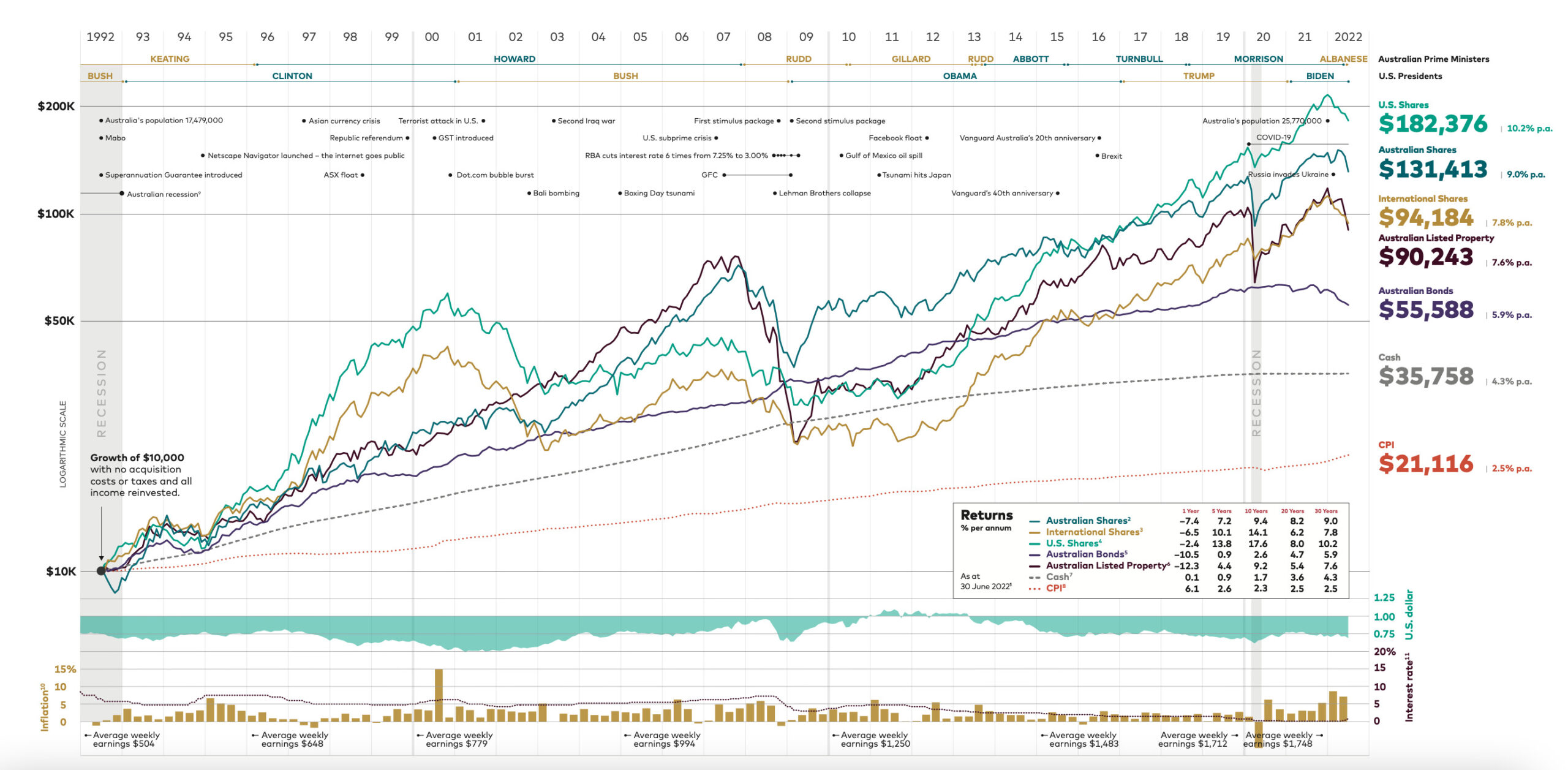Cash makes a comeback as only asset to class to generate a positive return in FY22

Pic: Getty Images
- Cash was king in FY22 as the only asset class to generate positive returns, according to Vanguard
- Total returns have been in negative territory across the board with challenging economic and geopolitical tensions
- US equities lead the race as the best performer over a 30-year period but diversity remains key
Cash is making a comeback as the only asset class to generate a positive return in FY22 according to investment management company Vanguard’s 21st annual index chart, which captures the performance of major asset classes over the last 30 years.
As investors and markets grapple with rising interest rates, inflation and geopolitical conflicts this year, total returns across the board have been negative.
But the best performing asset class in FY22 was cash with 0.1 % return, a title last held during the Global Financial Crisis when investors fled to what are considered the safer asset classes of cash and high-quality fixed income products.
The worst performing asset class was Australian listed property, returning -12.3% in FY22. However Vanguard Australia’s head of Personal Investor Balaji Gopal sad it is worth noting Australian listed property returned 33.2% the year before and was amongst the best performing asset classes.
“Vanguard’s 2022 Index Chart is perfect proof of why investors should diversify,” he said.
Gopal said it is worth investors noting that different asset classes won’t always win the race, there will be times they will trip and fall with another shining through.
“In the last 30 years, every major asset class has had a turn at being the best performing, as well as the worst,” he said.
2022 Vanguard Index Chart

Bonds and equities both tumble
It has been an unusual year where both bonds and equities have fallen together. When bonds go down, stock prices tend to rise. The opposite also happens, when bond prices rise stock prices tend to fall.
Bonds tend to compete with stocks for investment with bonds considered the safer asset class. But this year both bonds and share markets have both felt pain.
However, long term government bonds historically have performed well during US recessional periods.
“While bonds and equities have experienced a rare joint downturn this year, history has proven market conditions as such are only fleeting and are not expected to materially affect long-term returns,” Gopal said.
“Investors who maintain a well-diversified portfolio with a healthy fixed income allocation will experience less volatility and be rewarded in the long run; markets will inevitably rebound and investment returns will grow again.”
How $10,000 grows over 30 years
Vanguard has also provided a table on how an initial investment of $10k would have performed across various asset classes over 30 years with the winner US shares, which would have grown to $182k today returning an average 10.2% per annum. Broad Australian shares would have grown to nearly $131,500 today, an average of 9% return annually.
30-year performance across asset classes

“Accumulated returns this year compared to last have dipped, but for the broad Australian market to still on average return 9% per annum, even with inflation concerns, Covid-19 and the GFC to account for, should be reassuring news for investors,” Gopal said.
“It’s a good reminder amidst today’s challenging conditions that successful investing depends not on market timing or picking the winning stock, but rather on broad diversification, long-term perspective and the discipline to stay invested when things get tough.”
The views, information, or opinions expressed in the interviews in this article are solely those of the interviewees and do not represent the views of Stockhead. Stockhead does not provide, endorse or otherwise assume responsibility for any financial product advice contained in this article.
UNLOCK INSIGHTS
Discover the untold stories of emerging ASX stocks.
Daily news and expert analysis, it's free to subscribe.
By proceeding, you confirm you understand that we handle personal information in accordance with our Privacy Policy.








